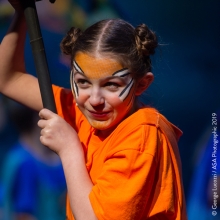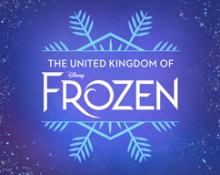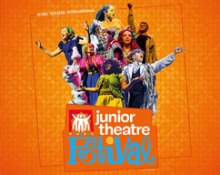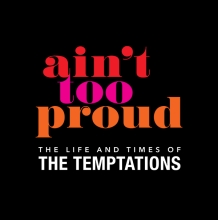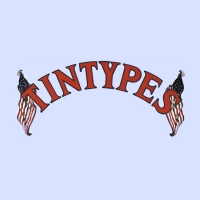
Full Synopsis
Act One
New York City at the turn of the twentieth century. Charlie, a newly arrived European immigrant, moves downstage holding a small bundle. He meets four people: TR, a young man-about-town who tosses him a penny; Anna, a socialite who is frightened away by his amorous overtures; Susannah, the first black woman he's ever seen; and Emma, who is seemingly blind. He gives her his first and only American coin. After thanking him with a nod, Emma, joins the other characters upstage, leaving Charlie alone with the audience. He addresses the audience directly, singing in his thick Yiddish accent ("The Yankee Doodle Boy"). Soon, the other characters join in and introduce themselves ("Ta-Ra-Ra- Boom-De-Ay!" / "I Don't Care" / "Come Take a Trip in My Airship" / "Kentucky Babe" / "A Hot Time in the Old Town Tonight").
Everyone grabs musical instruments and accompany themselves in a salute to the American flag ("Stars and Stripes Forever"). The characters revel with one another and the audience members, talking about the remarkable inventions that exist in their world. At first, they have some trouble getting everything to work properly. Eventually, all of the machines are up and running, while TR directs a light bulb to fly in ("Electricity").
There's a flash as Charlie takes a picture, and Susannah declares that Cuban revolutionaries have declared war on Spain. TR steps onto a soapbox as the other characters hand him props and costume pieces that prepare him for war. He reacts to the headlines. Susannah continues to chant. After Susannah announces that America has declared war on Spain, TR strides downstage, transforming into Teddy Roosevelt. He goes back to his soapbox and resigns as the Assistant Secretary to the Navy, so that he can fight on the front line. Everyone cheers as Teddy Roosevelt gives bits of fighting advice ("Teddy"). Teddy then rallies the other characters by praising himself and outlining what they're going to do ("El Capitan").
All of the characters drift offstage except for Charlie. As an immigrant, alone in The City, Charlie applies to be a foreman in a factory. He gets the job, but the machine soon frustrates him. He falls asleep and dreams about the magical wheels of the twentieth century, including Ferris wheels, bicycles, trains and cars ("Meet Me in St. Louis"). The sequence begins with Anna appearing upstage holding a helium balloon. She flirts with him. Once they finally embrace, TR, a handsome young dandy, enters on a bicycle. Seeing that Anna is instantly smitten, Charlie honks the bicycle horn jarringly. Susannah and Emma enter, dancing dreamily and hoping for one more spin around the floor ("Waltz Me Around Again, Willie"). A train whistle goes off and catches everyone's attention. The ensemble then starts building a car ("In My Merry Oldsmobile").
Charlie wakes up. TR pops the balloon and orders him back to work as he throws an apron at Susannah. Emma, wearing glasses that identify her as Emma Goldman, joins Charlie and Susannah in miming repetitive factory jobs. TR and Anna are shadowy presences upstage. Emma gives a speech about the horrible working conditions that she's experienced while Susannah sings bits of spirituals ("Wayfaring Stranger" / "Sometimes I Feel Like a Motherless Child" / "Ay, Lye, Luy Lye"). Charlie also writes a letter to the editor of a newspaper, which is interspersed with Emma's speech. He wants advice about a woman whom he has met; he loves her, but she has a dimple in her chin – which is bad luck (" I'll Take You Home Again, Kathleen"). Gradually, Emma's speech becomes an impassioned call to arms ("America the Beautiful" / "Wait for the Wagon"). TR brings her speech to a halt. They go into a love song that is riddled with animosity, as they try to upstage each other ("What It Takes").
A spot comes up on Charlie. He introduces the audience to the Ziegfeld Follies star, Anna Held. Another spot comes up on Anna, who is intimate and coy with the audience. We go to Anna's dressing room backstage as her maid, Susannah, helps her get ready. TR and Charlie are reporters; Emma stands off to the side, hoping that Anna will autograph her fan magazine. TR and Charlie interview Anna, who answers in an affected French accent while taking a bath. Anna explains that everything about her is natural and speaks about her ability to charm the audience with her magnetism ("The Maiden with the Dreamy Eyes"). Anna finishes dressing, and everyone except Susannah move offstage. Anna moves towards the audience – she is now onstage, where she performs her number ("If I Were on the Stage"). Charlie hands her a bouquet, and he and Emma greet her as she sweeps upstage.
Susannah opens Anna's fan and tries to imagine herself as an actress. She is interrupted by the ensemble, who use heavy Southern accents to portray stereotypical versions of black characters ("Shortnin' Bread"). On their last line, they exit. Susannah, now alone, takes off her servant's cap and apron, reflecting on her loneliness ("Nobody"). Charlie is asleep on a bench. As a police officer, TR wakes him. Susannah, an apple seller, comes by, and Charlie eventually coaxes an apple from her. He refuses to give any to Emma, a hungry waif, but since he can't eat it while she's watching him, he tries to distract her. Emma succeeds in distracting him, however, and steals the apple. Charlie steals it back and is about to eat it when Anna, a young socialite, takes his picture. She then asks Charlie to take her picture. She holds the apple as he does so, but she leaves before remembering to give it back. Charlie looks for Anna. TR comes back and gives him a ticket for loitering. Charlie stuffs the ticket in TR's pocket, but TR then stuffs it in Charlie's mouth. Susannah comes back, singing about how she'll get by, even when times are tough ("I'm Gonna Live Anyhow"). Everyone joins in.
Act Two
A spotlight comes up on Susannah, who is on one side of the stage. The rest of the cast is in a pool of light on the other side, frozen in dance positions. They slowly perform a stylized dance while still retaining their own personal characteristics. Susannah urges them to dance ragtime ("Ragtime Dance"). After a lengthy dance break, lights bump up, and everyone dances furiously ("Hot Time in the Old Town Tonight"). Someone grabs the soapbox and puts it in position for TR, who becomes Teddy Roosevelt as soon as he jumps up on it. He delivers excerpts from a few speeches: one insisting that he would never be a vice presidential candidate; one stating how much he enjoys being a vice presidential candidate but would never run for president; and one accepting the presidency after President McKinley's assassination. Admitting that he loves being president, TR grabs a pail and shovel, looking for a place to dig to Panama. Susannah explains that Teddy Roosevelt wanted a treaty with Colombia that would give the U.S. a lease to the Isthmus of Panama, but Colombia refused. Teddy declares that he gets whatever he wants ("I Want What I Want"). Anna and Charlie enter as an ambassador and his wife. They draw up a treaty, and Anna reveals a flag that reads "Visit Panama."
Moving downstage, Anna becomes Anna Held during her White House visit. She meets Teddy Roosevelt and performs for him ("It's Delightful to Be Married"). Susannah then relays the story of a troubled marriage, which Emma reveals is actually about Flo Ziegfeld cheating on his wife and the lack of women's rights ("Fifty-Fifty"). TR then enters as a reporter and interviews, Anna, Emma and Susannah, who are newly arrived mail-order brides. Charlie goes up to each woman to inspect her, but all three reject him. Charlie reflects on the direction of his life ("Satisfied with Life"). Emma and Susannah rejoin Charlie, reciting newspaper headlines as they position three chairs and a soapbox in the center of the stage. Emma details her hard financial luck ("Jonah Man"). TR and Anna enter as the "haves," with Charlie, Emma and Susannah positioned as the "have-nots." TR invites everyone to play musical chairs with the chairs and soapbox, but no one else is clear on the rules until after the first round, when Susannah is out. It becomes clear that the game is rigged. Emma is the next to go, followed by Charlie and then, finally, Anna, leaving TR on his own ("When It's All Goin' Out").
As Roosevelt, TR stands on the soapbox and begins pontificating. Emma brings out her own soapbox and speaks from it, reciting one of Emma Goldman's speeches. Susannah, Anna and Charlie follow suit, giving speeches by Booker T. Washington, Susan B. Anthony and Eugene V. Debs, respectively. Eventually, their speeches merge into a strongly rhythmic chant until they fall in unison ("We Shall Not Be Moved"). Charlie, now a Jewish stand-up comic, addresses the audience with a rambling monologue. TR enters as an Italian comic, and the two do a routine dripping with ethnic stereotypes. TR performs a mocking number about Teddy Roosevelt ("Teddy da Roose"). He exits, and Anna enters as a grande dame of the theatre, performing her own number ("A Bird in a Gilded Cage"). Emma interrupts her when she rollerskates by, as a Fanny Brice-type comic. They banter until Emma rollerskates offstage. Anna tries to resume her song, but unbeknownst to her, Emma enters with a violin. Emma accompanies her badly. They try to drown each other out, with Emma emerging as the victor. They exit as Susannah enters, wishing for her love to return ("Bill Bailey").
Charlie and TR enter, with Charlie wearing minstrel show-style white gloves and TR with a banjo. Charlie hands Susannah a parasol. She dances a cakewalk ("She's Getting More Like the White Folks Every Day"). Anna and Emma enter, also wearing white gloves, and join in. Everyone but Charlie exits. Charlie brings the focus back to a patriotic tone as the ensemble enters with small American flags ("You're a Grand Old Flag" / "The Yankee Doodle Boy – Reprise"). The cast freezes. Anna moves downstage and sings, addressing the audience with a sentiment of growing up ("Toyland"). Finally, everyone exits except for Charlie, who is alone with the camera and the bench. Susannah enters. Charlie tries to take her picture, but she can't afford it. He gives her a flower from his lapel before she leaves. TR and Anna enter; Anna wants her picture taken, but TR insists that they don't have enough time, so they exit. Emma enters, very upset. Charlie managers to cheer her up. She accidentally knocks him off of the bench. At first, he's angry but he realizes that they're meant for each other ("Toyland Smiles").
Show History
Inspiration
With its timeframe set between the half-century after the Civil War and the onset of the Roaring Twenties, the period of Tintypes is one of the most turbulent eras in American history, as well as one of explosive growth: America's population doubled in thirty years, and one-third of the leap came from abroad; the transcontinental railroad and Carnegie Hall were built; electricity and the telephone were introduced to homes; cowboy Theodore Roosevelt became President of the United States; automobiles joined horse-drawn carriages on city streets; and children worked in factories for 25 cents a day. This chamber piece with a cast of five draws from, and was inspired by, this time, providing a musical history lesson that focuses on an exciting and tumultuous period in American history.
Productions
Tintypes, conceived by Mary Kyte with Mel Marvin and Gary Pearle, is a musical revue with a blend of the patriotic songs, romantic tunes and ragtime by such artists as George M. Cohan, John Philip Sousa, Joseph E. Howard, Scott Joplin and Victor Herbert, among others.
First developed and premiered at Arena Stage in Washington, D.C., in early 1980, Tintypes then went on that year to have a commercial run Off-Broadway at the York Theatre, where it opened on April 17, 1980, and ran for 137 performances through the summer. The revue closed on August 10, 1980, shuttering for an uptown move to Broadway.
On October 23, 1980, after eleven previews, Tintypes then opened on Broadway at the John Golden Theatre, where it ran for 93 performances, closing on January 11, 1981. It was directed by Gary Pearle and choreographed by Mary Kyte, co-conceivers with Mel Marvin. The original cast included Lynne Thigpen, Jerry Zaks, Trey Wilson, Carolyn Mignini and Mary Catherine Wright. Tintypes continues to be an unexpected favorite among audiences and performers alike wherever it is revived; people respond very well to the nuggets of veritably lost national treasures.
Cultural Influence
- A cast recording from the original Broadway cast of Tintypes was released by DRG on March 31, 1981.
- A DVD of the original Broadway production of Tintypes was released on March 29, 2005, more than two decades after the production closed.
Trivia
- Tintypes was nominated for three Tony Awards in 1981, including Best Musical and Best Book of a Musical, and was also nominated for six Drama Desk Awards that year, including Outstanding Musical.
Critical Reaction
"A flag-waving winner."
– Baltimore Sun
"Few shows work like a charm. They may labor like a plowhorse, or calculate like a slide rule – but they seldom have the flair of Tintypes... easy to love... Mary Kyte, Mel Marvin, and Gary Pearle have cleverly arranged this group of diverting tunes."
– Chicago Reader
"Just the sort of tuneful summer fun needed to counteract the effects of grimmer current events."
– New York Times
"Tintypes succeeds beyond most musical revues& and what amazing music."
– Austin Chronicle
"Poignant."
– Los Angeles Times
Drama Desk Award
Tony® Award
Connect
Billing
- Book by
- Music by
- Lyrics by
Requirements
Included Materials
| Item | Quantity Included |
|---|---|
| DIRECTOR'S SCRIPT | 2 |
| LIBRETTO/VOCAL BOOK | 6 |
| PIANO CONDUCTOR'S SCORE | 2 |
Production Resources
| Resource |
|---|
| HOW DOES THE SHOW GO ON-10/CS |
| HOW DOES THE SHOW GO ON? |
| PRODUCTIONPRO-DIGITAL SCRIPT/SCORE |
| REFERENCE RECORDING |
| STAGE WRITE APPLICATION |
STANDARD ORCHESTRATION
| Instrumentation | Doubling |
|---|---|
| CELLO | |
| PERCUSSION | BELLS , CASTANETS , TAMBOURINE , TEMPLE BLOCKS , TRAIN WHISTLE , TRIANGLE , VIBRAPHONE , WOOD BLOCK , XYLOPHONE |
| REED 1 | CLARINET , FLUTE , PICCOLO |
| TROMBONE | BASS TROMBONE , TROMBONE |
| VIOLIN |
